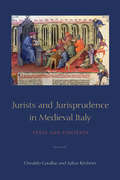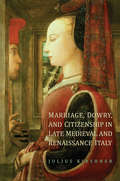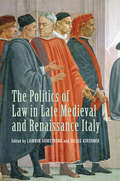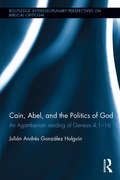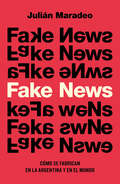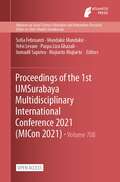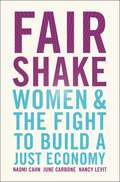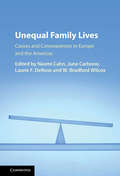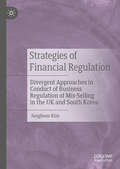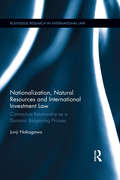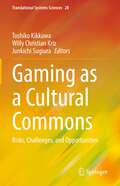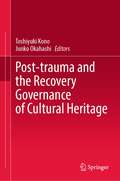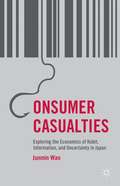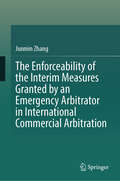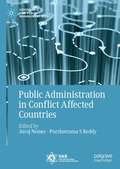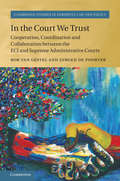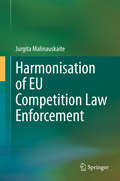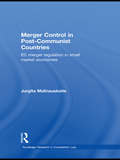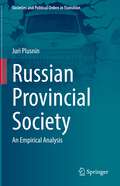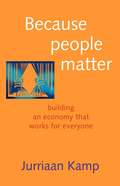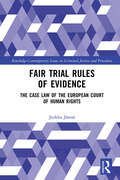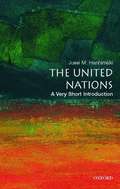- Table View
- List View
Jurists and Jurisprudence in Medieval Italy: Texts and Contexts (Toronto Studies in Medieval Law)
by Julius Kirshner Osvaldo CavallarJurists and Jurisprudence in Medieval Italy is an original collection of texts exemplifying medieval Italian jurisprudence, known as the ius commune. Translated for the first time into English, many of the texts exist only in early printed editions and manuscripts. Featuring commentaries by leading medieval civil law jurists, notably Azo Portius, Accursius, Albertus Gandinus, Bartolus of Sassoferrato, and Baldus de Ubaldis, this book covers a wide range of topics, including how to teach and study law, the production of legal texts, the ethical norms guiding practitioners, civil and criminal procedures, and family matters. The translations, together with context-setting introductions, highlight fundamental legal concepts and practices and the milieu in which jurists operated. They offer entry points for exploring perennial subjects such as the professionalization of lawyers, the tangled relationship between law and morality, the role of gender in the socio-legal order, and the extent to which the ius commune can be considered an autonomous system of law.
Marriage, Dowry, and Citizenship in Late Medieval and Renaissance Italy
by Julius KirshnerThrough his research on the status of women in Florence and other Italian cities, Julius Kirshner helped to establish the socio-legal history of women in late medieval and Renaissance Italy and challenge the idea that Florentine women had an inferior legal position and civic status.In Marriage, Dowry, and Citizenship in Late Medieval and Renaissance Italy, Kirshner collects nine important essays which address these issues in Florence and the cities of northern and central Italy. Using a cross-disciplinary approach that draws on the methodologies of both social and legal history, the essays in this collection present a wealth of examples of daughters, wives, and widows acting as full-fledged social and legal actors.Revised and updated to reflect current scholarship, the essays in Marriage, Dowry, and Citizenship in Late Medieval and Renaissance Italy appear alongside an extended introduction which situates them within the broader field of Renaissance legal history.
The Politics of Law in Late Medieval and Renaissance Italy
by Julius Kirshner Lauro Martines Lawrin ArmstrongThe Politics of Law in Late Medieval and Renaissance Italy features original contributions by international scholars on the fortieth anniversary of the publication of Lauro Martines' Lawyers and Statecraft in Renaissance Florence, which is recognized as a groundbreaking study challenging traditional approaches to both Florentine and legal history.Essays by leading historians examine the professional, social, and political functions of Italian jurists from the thirteenth to the late fifteenth centuries. The volume also examines the use of emergency powers, the critical role played by jurists in mediating the rule of law, and the adjudication of political crimes. The Politics of Law in Late Medieval and Renaissance Italy provides both an assessment of Martines' pioneering archival scholarship as well as fresh insights into the interplay of law and politics in late medieval and Renaissance Italy.
Mission, Inc.: The Practitioners Guide to Social Enterprise
by Kevin Lynch Julius WallsIn this groundbreaking book, Julius Walls and Kevin Lynch offer a complete guide to confronting the complexities these businesses present.
Cain, Abel, and the Politics of God: An Agambenian reading of Genesis 4:1-16 (Routledge Interdisciplinary Perspectives on Biblical Criticism)
by Julián Andrés González HolguínThe Genesis story of Cain’s murder of Abel is often told as a simplistic contrast between the innocence of Abel and the evil of Cain. This book subverts that reading of the Biblical text by utilising Giorgio Agamben’s concepts of homo sacer, the state of exception and the idea of sovereignty to re-examine this well-known tale of fratricide and bring to the fore its political implications. <P><P>Drawing from political theory, philosophy, and psychoanalysis, this book creates a theoretical framework from which to do two things: firstly, to describe and analyse the history of interpretation of Genesis 4:1-16, and secondly to propose an alternative reading of the Biblical text that incorporates other texts inside and outside of the Biblical canon. This intertextual analysis will highlight the motives of violence, law, divine rule, and the rejected as they emerge in different contexts and will evaluate them in an Agambenian framework. <P><P>The unique approach of this book makes it vital reading for any academic with interests in Biblical Studies and Theology and their interactions with politics and ethics.
ChuzaDAS
by Julián Fernando Martínez VallejoLa historia detrás de las chuzadas del DAS. Aunque el tema es parcialmente conocido, el reportero Julián F. Martínez en esta impresionante investigación, logra poner en contexto -además de adicionar datos aún desconocidos y una rigurosa documentación-, uno de los periodos más oscuros de la historia política del país. Más allá de lo que se llamaron las #chuzaDas#, este libro aborda otros hechos graves como espionaje, amenazas, persecución y asesinatos.
Fake news: Cómo se fabrican en la Argentina y en el mundo
by Julián MaradeoA partir de casos locales y del mundo, el libro cuenta la historia de las noticias falsas, de cómo nos ponen en estado de alerta y, al mismo tiempo, refleja la debilidad estatal, la falta de control y el enorme lobby alrededor de ellas. La imagen de una chica con su bebé en brazos mientras carga en la espalda una caja térmica de delivery es la punta del iceberg de un fenómeno que sacudió las nociones de verdad y mentira: las fake news. Todos estamos expuestos y a la vez las reproducimos hasta convertirlas en pandémicas. Sus consecuencias pueden alterar elecciones, decisiones de gobierno e incluso provocar muertes. A partir de casos locales y del mundo, el libro cuenta la historia de las noticias falsas, de cómo nos ponen en estado de alerta y, al mismo tiempo, reflejan la debilidad estatal, la falta de control y el enorme lobby alrededor de ellas. «Esta investigación -dice Julián Maradeo- trata sobre otra forma de ejercer el poder. Una que es imperceptible, escurridiza, placentera y extraterritorial. Una que jaquea a todas las teorías que discurrieron por siglos al respecto. Una en la que interviene un lenguaje que resulta ajeno, sujetos que parecen salidos de una película, geografías remotas. Una que pone en entredicho las reglas del juego democrático. Las noticias falsas no discriminan entre Oriente y Occidente, afectan a todos sin mirar a quién».
Proceedings of the 1st UMSurabaya Multidisciplinary International Conference 2021 (Advances in Social Science, Education and Humanities Research #708)
by Sofia Februanti Mundakir Mundakir Yelvi Levani Puspa Liza Ghazali Jumadil Saputra Mujiarto MujiartoThis is an open access book. Internationalization is one aspect of becoming qualified in this globalization era, especially for higher education levels. In this particular era when everyone is locked down due to Covid 19 Virus, the academic activity must still run. It is correlated with vision of Universitas Muhammadiyah Surabaya as an international standard university so that it can compete with universities at national or international level. During Pandemy, many obstacles occur then it is also led with many opportunities.
Fair Shake: Women and the Fight to Build a Just Economy
by June Carbone Naomi Cahn Nancy LevitA stirring, comprehensive look at the state of women in the workforce—why women&’s progress has stalled, how our economy fosters unproductive competition, and how we can fix the system that holds women back.In an era of supposed great equality, women are still falling behind in the workplace. Even with more women in the workforce than in decades past, wage gaps continue to increase. It is the most educated women who have fallen the furthest behind. Blue-collar women hold the most insecure and badly paid jobs in our economy. And even as we celebrate high-profile representation—women on the board of Fortune 500 companies and our first female vice president—women have limited recourse when they experience harassment and discrimination. Fair Shake: Women and the Fight to Build a Just Economy explains that the system that governs our economy—a winner-take-all economy—is the root cause of these myriad problems. The WTA economy self-selects for aggressive, cutthroat business tactics, which creates a feedback loop that sidelines women. The authors, three legal scholars, call this feedback loop &“the triple bind&”: if women don&’t compete on the same terms as men, they lose; if women do compete on the same terms as men, they&’re punished more harshly for their sharp elbows or actual misdeeds; and when women see that they can&’t win on the same terms as men, they take themselves out of the game (if they haven&’t been pushed out already). With odds like these stacked against them, it&’s no wonder women feel like, no matter how hard they work, they can&’t get ahead. Fair Shake is not a &“fix the woman&” book; it&’s a &“fix the system&” book. It not only diagnoses the problem of what's wrong with the modern economy, but shows how, with awareness and collective action, we can build a truly just economy for all.
Unequal Family Lives: Causes and Consequences in Europe and the Americas
by June Carbone Naomi Cahn W. Bradford Wilcox Laurie F. DeRoseAcross the Americas and Europe, the family has changed and marriage is in retreat. To answer the question of what's driving these changes and how they impact social and economic inequality, progressives have typically focused on the economic causes of changing family structures, whereas conservatives tend to stress cultural and policy roots. In this illuminating book, an international group of scholars revisit these issues, offering competing and contrasting perspectives from left, center, and right, while also adding a third layer of analysis: namely, the role of gender - changes in women's roles, male employment patterns, and gendered family responsibilities - in driving family change across three continents. Unequal Family Lives: Causes and Consequences in Europe and the Americas adds richness and depth to our understanding of the relationship between family and economics in the United States, Europe, and Latin America. This title is also available as Open Access.
Strategies of Financial Regulation: Divergent Approaches in Conduct of Business Regulation of Mis-Selling in the UK and South Korea
by Junghoon KimThis book analyses different strategies and their results in implementing financial regulation in terms of rule-making, public enforcement and private enforcement. The analysis is based on a comparative study of conduct of business regulation on mis-selling of financial instruments in the UK and South Korea. It extends into liquidity regulation in the banking sector and credit rating agency regulation. The book concludes that in rule-making, purposive rules are more effective for achieving regulatory goals with minimal undesirable results, but a rule-making system with purposive rules can only work on a foundation of trust among rule-makers, enforcers and the regulates, that with respect to public enforcement, the enforcement strategies should combine the compliance-oriented and deterrence-oriented approaches and be continuously adjusted based on close monitoring of the regulatory outcomes and that in private enforcement, regulation should be instituted as the minimum requirement in private law.
Presumed Guilty
by Junius PodrugA woman's attempts to solve her mother's murder in Russia wind up getting her accused of the crime in this courtroom thriller.
Nationalization, Natural Resources and International Investment Law: Contractual Relationship as a Dynamic Bargaining Process (Routledge Research in International Law)
by Junji NakagawaNationalization disputes in natural resources development are among the most disputed issues of international investment law. This book offers a fresh insight into the nature of nationalization disputes in natural resources development and the rules of international investment law governing them by systematically analyzing (1) the content of investment contracts in natural resources development, and (2) the results of nationalization disputes in natural resources development from the perspective of dynamic bargaining theory. Based on the comprehensive and systematic empirical analyses, the book sheds new light on contractual renegotiation and renewal as a hardly known but practically normal solution of nationalization disputes and presents a set of soft law rules governing contractual renegotiation and renewal.
Gaming as a Cultural Commons: Risks, Challenges, and Opportunities (Translational Systems Sciences #28)
by Willy Christian Kriz Toshiko Kikkawa Junkichi SugiuraThis book focuses on relatively neglected areas of simulation and gaming (S&G), i.e., cultural aspects and ethical issues, in addition to giving readers a basic knowledge of S&G. Although the educational effects of S&G, and related methods such as gamification, as well as serious games have been studied and are gaining recognition, their downsides are often overlooked. For example, there is always a risk of manipulation by games if maliciously designed and facilitated. Ethical codes of game designers, facilitators, and educators must be established on the basis of academic research. Considerations of the ethics of games are essential not only for S&G researchers and educators but also for the general public, because games have sometimes been used for propaganda purposes in the past and could be again, in the present and future. Looking at the cultural aspect, as the S&G community has accumulated research over 50 years, the book includes the knowledge of the pioneers, i.e., archival interview data. This is the first book that includes extensive interviews of researchers and commercial game designers and critics. It also contains diverse topics from the perspective of gender and Japanese culture. Japan has been attracting attention in the field of board games as there are many independent game designers and an expanding market. Although women in S&G have gained some recognition, the topic has been rather ignored and was first officially discussed in 2019 at the international conference of the International Simulation and Gaming Association held in Warsaw. In summary, by focusing on comparatively overlooked or neglected aspects of S&G, this book expands future opportunities in the field for researchers and educators, with increased awareness by the general public.
Post-trauma and the Recovery Governance of Cultural Heritage
by Toshiyuki Kono Junko OkahashiThis book successfully represents the indispensable interdisciplinarity of viewpoints by its authors combining legal perspectives with architectural and anthropological approaches. With the observation and analysis presented here, this book is the first to demonstrate research-based governance solutions for cultural heritage within the process of recovering from traumatic events. Its opening statement is that universal international standards are not effective enough for the specific situations of disaster-struck places.A major objective of this monograph is to allow its readers to go through a learning experience, from plural cases where reconstruction of cultural heritage became central to rebuilding a post-disaster society. This book introduces Japan as the most disaster-prone country, with a long history of confronting and overcoming the power of nature, resulting in its unique solutions for cultural heritage resilience and sustainability. But how do leadership and decision making become efficient in times of recovery? Bearing in mind what may be lacking in Japanese practices, this work also presents comparable governance models from other countries which indicate alternative solutions.While a traumatic event may occur within one night, the process of recovery could last for decades. Such disasters also tend to recur. In order that directly affected communities can sustain resilience throughout the long recovery period, and that equally severe social trauma will not be repeated, a continuous, well-maintained governance response is required, whether grounded in local knowledge or national policy frameworks. At the heart of this book is the matter of the reconstruction process involving networks of small and large communities. Each of those has a role that becomes operational through linkages of contacts, the interchange of knowledge and skills, and above all through the sharing of common goals.
Consumer Casualties
by Junmin WanJunmin Wan takes a two prong approach to analysing this pressure in Japan in his new volume Consumer Casualties. He first clarifies the consumer preference for habit to identify useful approaches toward solving a number of economic issues, such as gambling and other addictive practices.
The Enforceability of the Interim Measures Granted by an Emergency Arbitrator in International Commercial Arbitration
by Junmin ZhangThis timely book offers a comprehensive study of the emergency arbitrator mechanism that provides interim measures in international commercial arbitration before the constitution of an arbitral tribunal, focusing on the enforceability of the interim measures granted. Based on the traditional legal doctrines of private international law, international dispute resolution, and arbitration law, this book is featured mainly in comparative studies. Six leading arbitral institutions are chosen to conduct systematic research on applying the emergency arbitration rules to establish a general and common procedural framework for emergency arbitration in discussion. Normative and comparative law analyses investigate the status quo of available legal instruments used to recognize and enforce interim measures in emergency arbitration by examining international conventions and three representative chosen jurisdictions, i.e., Singapore, Mainland China, and the USA. Following these two levels of comparison, it highlights and examines the potential doctrinal and practical barriers that may impact the enforceability of interim measures rendered by an emergency arborator. Finally, it proposes various approaches that could be used to improve the enforceability controversy, and it offers innovative suggestions for further research. This book is of particular relevance and interest to students, researchers, and practitioners in dispute resolution and arbitration law, as well as policymakers, legislators, and arbitral institutions considering further reform in international arbitration.
Public Administration in Conflict Affected Countries (Governance and Public Management)
by Juraj Nemec Purshottama S ReddyThis book highlights the main factors determining the quality of public administration in conflict affected countries; and assesses to what extent the conflict determines and impacts on the performance of public administration in affected countries. The main value added by this book is confirming the general expectation that there is no direct and universal link between the conflict and public administration performance (and vice-versa). One may need to argue that each country situation differs and specific factors of internal and external environments determine the trends of public administration performance in conflict affected countries. To achieve the overarching goal of the book, sixteen country studies were developed from all relevant continents - America, Africa, Asia and Europe: Bangladesh, Colombia, Croatia, Egypt, Georgia, Iraq, Kosovo, Nigeria, Palestine, Paraguay, Philippines, Serbia, South Africa, Uganda, Ukraine, and Venezuela.
In the Court We Trust: Cooperation, Coordination and Collaboration between the ECJ and Supreme Administrative Courts (Cambridge Studies in European Law and Policy)
by Jurgen de Poorter Rob van GestelThe preliminary reference procedure has long been envisaged as a judicial dialogue between the European Court of Justice and national courts. However, in reality the relationship appears to be closer to one of growing separation rather than to a happy marriage between equal partners. This book tries to find out: what is behind this? A study of the existing literature, combined with a case law analysis and interviews with judges, has shown that there are a number of important stumble blocks hindering the communication between these courts, such as language barriers, time constraints, and a failing digital infrastructure. However, on a deeper level there also appears to be a lack of mutual trust that prevents Supreme Administrative Courts from using the possibilities the procedure provides, such as the opportunity to offer provisional answers to the Court of Justice and the use of requests for clarification by the latter.
Harmonisation of EU Competition Law Enforcement
by Jurgita MalinauskaiteThis book explores how the EU’s enforcement of competition law has moved from centralisation to decentralisation over the years, with the National Competition Authorities embracing more enforcement powers. At the same time, harmonisation has been employed as a solution to ensure that the enforcement of EU competition rules is not weakened and the internal market remains a level playing field.While employing a comparative law argument, the book, accordingly, analyses the need for harmonisation throughout the different stages of development of the EU’s competition law enforcement (save Merger control and State Aid), the underlying rationale, and the extent to which comparative studies have been undertaken to facilitate the harmonisation process from an historical perspective. It also covers the Directives, such as the Antitrust Damages Directive and the ECN+ Directive. Investigating both public and private enforcement, it also examines the travaux préparatoires for the enforcement legislation in order to discover the drafters’ intent. The book addresses the European and the Member States’ perspectives, namely, the Central and Eastern European (CEE) countries, as harmonisation proceeds through dialogue and cooperation between the two levels. Lastly, it explores the extent to which harmonisation of the competition law enforcement framework has been accepted and implemented in the Member States’ legal systems, or has led to the fragmentation of the national systems of the CEE countries.
Merger Control in Post-Communist Countries: EC Merger Regulation in Small Market Economies (Routledge Research in Competition Law)
by Jurgita MalinauskaiteThis book provides a critical analysis of merger control regimes in the former socialist countries with small market economies, looking at the unique challenges facing these economies. Questions will be asked as to what extent these countries have had to follow dictation from the EU and whether this implementation of EU merger control rules has been justified from the point of view of these countries' economic situations. The book will analyse the merger control regimes in Estonia, Latvia and Lithuania, Slovenia and Slovakia. However, reference will be made to other small market economies of the EU including Cyprus, Ireland, Luxembourg and Malta in order to evaluate the particular difficulties the former socialist countries with small market economies have had in the implementation and further development of merger control rules.
Russian Provincial Society: An Empirical Analysis (Societies and Political Orders in Transition)
by Juri PlusninThis book presents a unique analysis of modern Russian provincial society. Based on detailed empirical evidence, it develops a theoretical model of Russian provincial society in the late 20th century and the early 21st century. The book explains how under the conditions of catastrophic changes, Russian provincial societies have undergone a structural transformation. It further sheds light on the transformation of the economic behavior of the population and households with regard to economic practices, crafts, and revived archaic forms of labor behavior. Summarizing the extensive empirical evidence, the book puts forward the concept of complementarity of two social structures at the local level: a ground "soft communal" structure and a "tightening with an iron hoop" estate state structure. Next, it discusses the stability and resistance of the local social structure to external political disturbances. Based on the presented analysis, the book introduces several independent criteria on the basis of which it establishes the typology of all empirically observed forms of societies. Subsequently, the book identifies six main types of Russian provincial societies. It explains how depending on the type, the different societies either adapt to political and economic changes in different ways, stay unchanged or transform their structure. The book will appeal to students, scholars, and researchers of economics, political science, sociology, and anthropology, interested in a better understanding of transformation studies, population and household economics, provincial societies, as well as Russian societal structures.
Because People Matter: Building an Economy that Works for Everyone
by Juriaan KampOur economy is focused on growth and profit. In any given business, success is measured by the flow of money, not the interest of the people involved. In Because People Matter, author Jurriaan Kamp tells us why there are better alternatives. Kamp argues that the world economy is not only based on money, but on human choices as well. It is those human choices that can promote the change necessary to transform our current crisis into a healthier economy that serves everyone. He offers insights on subjects such as a new method of dealing with national income; taxing the use of raw materials rather than income; a world trade based on reciprocity; money without interest; and the liability of shareholders and managers for negligence and environmental damage. Borrowing ideas from prominent economists, Kamp offers a coherent set of conditions for an economy in which it is the people that matter.
Fair Trial Rules of Evidence: The Case Law of the European Court of Human Rights (Routledge Contemporary Issues in Criminal Justice and Procedure)
by Jurkka JämsäThis book examines how the European Court of Human Rights approaches the matter of evidence, and how its judgments affect domestic law.The case law of the Court has affected many areas of law in Europe. One of these areas is the law of evidence, and especially criminal evidence. This work examines the key defence rights that may touch upon evidence, such as the right to adduce evidence, the right to disclosure, the privilege against self-incrimination and access to a lawyer, entrapment, and the right to cross-examine prosecution witnesses. It explains the relevant assessment criteria used by the Court and introduces a simple framework for understanding the various assessment models developed by the Court, including "the Perna test", "the Ibrahim criteria", and "the sole or decisive rule".The book provides a comprehensive overview on the relevant case law, and will be a valuable asset for students and researchers, as well as practitioners, such as judges, prosecutors, and lawyers, working in the areas of criminal procedure and human rights.
The United Nations: A Very Short Introduction
by Jussi M. HanhimäkiThe United Nations has been called everything from "the best hope of mankind" to "irrelevant" and "obsolete." With this much-needed introduction to the UN, Jussi Hanhimäki engages the current debate over the organizations effectiveness as he provides a clear understanding of how it was originally conceived, how it has come to its present form, and how it must confront new challenges in a rapidly changing world. After a brief history of the United Nations and its predecessor, the League of Nations, the author examines the UN's successes and failures as a guardian of international peace and security, as a promoter of human rights, as a protector of international law, and as an engineer of socio-economic development. Hanhimäki stresses that the UN's greatest problem has been the impossibly wide gap between its ambitions and capabilities. In the area of international security, for instance, the UN has to settle conflicts--be they between or within states--without offending the national sovereignty of its member states, and without being sidelined by strong countries, as happened in the 2003 intervention of Iraq. Hanhimäki also provides a clear accounting of the UN and its various arms and organizations (such as UNESCO and UNICEF), and he offers a critical overview of how effective it has been in the recent crises in Rwanda and the former Yugoslavia, for example--and how likely it is to meet its overall goals in the future. The United Nations, Hanhimäki concludes, is an indispensable organization that has made the world a better place. But it is also a deeply flawed institution, in need of constant reform.
